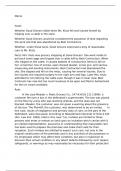Memo
Issue:
Whether Good Grocers liable when Ms. Klutz fell and injured herself by
tripping over a cable in the store.
Whether Good Grocers would be considered the possessor of land regarding
the work site that was abandoned by Best Contractors.
Whether, under these facts, Good Grocers exercised a duty of reasonable
care to Ms. Klutz.
Facts: Mrs. Klutz was grocery shopping at Good Grocers. She went inside to
put back some eggs and tripped over a cable left by Best Contractors. When
she tripped on the cable, it caused baskets of construction items to fall on
her: a hammer, box of screws, open drywall plaster, screw gun, and various
measuring and leveling instruments. Best Contractors had abandoned the
site. She slipped and fell on the mess, causing her several injuries. Due to
her injuries she required surgery to her right arm and legs. Later Mrs. Klutz
admitted to not noticing the cable even though it was in clear view. Best
Contracts has now lost too much business to be open and fled to Switzerland
for the ice cream available.
Rule:
In the case Meader v. Paetz Grocery Co., 147 N.W.2d 211 (1996). a
customer fell over a box in the defendant’s supermarket. The box was placed
on the floor by a boy who was stocking shelves, and the aisle was not
blocked. Meader, the customer, was not given a warning about the presence
of the box. The Plaintiff, the customer, was determined to be an invitee. In
this case, issues of negligence and primary duty of care, on the part of the
defendant, were discussed. According to Restatement (Second) of Torts § 343
(Am. Law Inst. 1965) cited in this case “(a), invitees are limited to those
persons who enter or remain on land upon an invitation which carries with it
an implied representation, assurance or understanding that reasonable care
has been used to prepare the premises and make them safe for their
reception. Such invitees are entitled to expect such care, not only in the
original construction of the premises and in any activities of the possessor or
his employees which may affect their condition, but also in inspection to
discover their actual condition or any latent defects followed by such repairs,
safeguards, or warnings as may reasonably be necessary for their protection
, Under the circumstances.” Id. at 343 It is also confirmed in id. At 343 that
“ ‘A possessor of land is subject to liability for physical harm *1107 caused to
his invitees by a condition on the land if, but only if, he (a) * * * (b) should
expect that they will not discover or realize the danger, or will fail to protect
themselves against it, and (c) * * *.’ Section 343A further provides: ‘A
possessor of land is not liable to his invitees for physical harm caused to
them by any activity or condition on the land whose danger is known or
obvious to them, unless the possessor should anticipate the harm despite
such knowledge or obviousness.’”. The court found that since the defect in
the premises was obvious to the plaintiff and she was aware of the general
practice of stocking shelves during open hours the store did not owe the
plaintiff a warning about these conditions. The defendant was not considered
negligent.
In Downs v. A & H Const., Ltd., 481 N.W.2d 520 an employee sought
damages against a general contractor for an injury. A construction worker
shot himself with a nail head gun while employed by a subcontractor to
frame a house. The issue argued was whether the company, A & H
Construction, was negligent in providing a safe environment for their
employee. Factors argued in pertaining to this issue were the nature of labor
and defining who is the “possessor” of the land. This case cites Restatement
(Second) of Torts §§ 328E, 343 when defining the “possessor” of land. “A
possessor of land is (a) a person who is in occupation of the land with intent
to control it or (b) a person who has been in occupation of the land with
intent to control it, if no other person has subsequently occupied it with
intent to control it, or (c) a person who is entitled to immediate occupation of
the land, if no other person is in possession under Clauses (a) and (b).” Due
to the nature of the work, the employee’s negligence, and not being
considered “possessor of land” A & H Construction was not considered liable
for their employee’s injuries. Id.343 was also cited stating when a possessor
of land is liable. “A possessor of land is subject to liability for physical harm
caused to his invitees by a condition on the land if, but only if, he (a) knows
or by the exercise of reasonable care would discover the condition, and
should realize that it involves an unreasonable risk of harm to such invitees,
and (b) should expect that they will not discover or realize the danger, or will
fail to protect themselves against it, and (c) fails to exercise reasonable care
to protect them against the danger.”
Application:




